Lucas Belury | PhD Program | School of Geography, Development and Environment | College of Social & Behavioral Sciences
Digital Humanities, Flood Justice, and the US-Mexico Borderlands
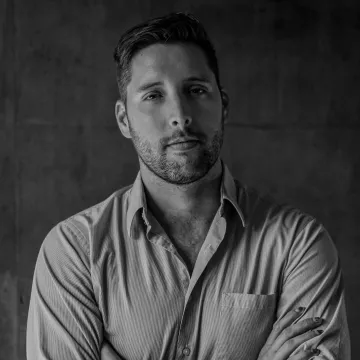
Flooding is a critical threat in the US-Mexico borderlands perpetuated by a lack of high quality, granular flood data. To challenge this flood injustice, Belury have co-conceived a participatory dissertation project that leverages satellite imagery and collaboration with community-based, flood justice advocacy organizations. This project focuses on two regions of the US-Mexico border: Nogales, Sonora/Nogales, Arizona (Ambos Nogales), and the Rio Grande/Rio Bravo Delta of the Texas-Tamaulipas border. The digital humanities can improve the impact of this project, transcend the disciplinary boundaries of flood mapping, and further engage local stakeholders and the public. With the 2023 Mellon-Fronteridades Graduate Fellowship Belury will produce and host the podcast Flood Justice in the Borderlands. This bilingual podcast will be conducted in English, then repeated in Spanish, thus communicating this information to bilingual audiences. Belury will host and produce one podcast on Ambos Nogales (English/Spanish) and one podcast in the Rio Grande/Rio Bravo Delta (English/Spanish), totaling four podcast episodes. In addition, Belury will develop a website to host the podcast series and the satellite flooding imagery Belury is generating. The website and accompanying satellite imagery will increase the communication of this project to the public and enhance the podcast experience by enabling listeners to visualize the scope and impact of these flood events. This bilingual podcast is also an opportunity to interview flood justice experts in the borderlands and share their knowledge with a broad and diverse audience.
Lucas Belury (he/him/el) is a geography Ph.D. student at the University of Arizona, where his research interests center on the lived experience of marginalized communities. His research projects include environmental racism along the US-Mexico border, knowledge co-production, and the queer archive. He has published articles on urban informality, environmental justice, and race equity. His current work utilizes the Latinx cultural concept of testimonios, or testimonies, to both elevate underprivileged voices and challenge (in)equity and (in)justice.
Linda Choi | PhD Program | School of Geography, Development and Environment | College of Social & Behavioral Sciences
A Place on Morley Avenue
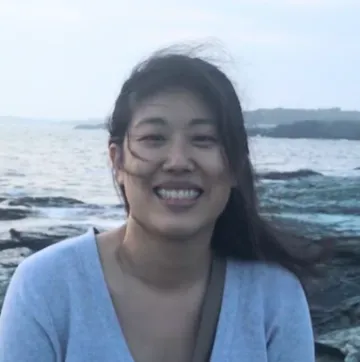
Choi's research project will explore through oral histories placemaking among business owners along Morley Avenue in Nogales, Arizona, a street known historically (1950s-1990s) for its commercial district catering to Mexican commercial clientele. Choi is interested in how this business district emerged, particularly in relation to Jewish and Asian American entrepreneurs. At the same time, Choi's oral histories will also explore how this vibrant commercial and cultural space was impacted by increased border militarization of the 1990s and beyond, in addition to the near closure of the border during the COVID pandemic. Choi sees Morley Avenue as a site of placemaking and cross-border flows, drawing from Choi's personal history with her own family’s shop along the border. This project moves beyond Choi's autoethnographic work to include oral histories from business-owning families along the street to gain a deeper and broader understanding of place making and belonging along the Arizona Borderlands.
Nathan Cordova | MFA Program | Photography, Video and Imaging | College of Fine Arts
Ghosts and Shadows

Cordova's project, Ghosts and Shadows, is a 20-minute audio/video artwork that aims to uncover a common auditory and visual language between humans and the US/Mexico Border as immaterial/material-entity. Cordova will use this uncovering of language to interpret the agency of its material properties. Cordova wonders, what else does the material of the border wall desire to become instead of its current desecrated, masculine and phallocentric form? As a part of this project, Cordova will employ resistance strategies integral to the counter-narratives of his family’s own oral histories. The oral history central to this endeavor is that of Cordova's uncle, who was a long-time labor activist and organizer beginning with the United Farm Workers in the 1960s and 70s. The interdisciplinary performance methodologies Cordova will employ to commune with the US/Mexico Border will evade rational understanding operating at sensorial and emotional registers. Cordova will screen the final 20-minute audio/video artwork locally in Tucson in a university setting. The screening will be followed by a community engagement discussion with group reflections. Discussion questions will be framed and guided by guest scholars from the university community. Additionally, Cordova will make the work and myself available for classes and symposiums.
Nathan Cordova is a multidisciplinary artist who works primarily with photography, video, sound, sculpture, and performance. He received his BA in Journalism from the University of Oregon (‘07) and is currently an MFA Candidate and GTA in the Photography, Video, and Imaging area at the University of Arizona’s College of Fine Arts (‘24). Nathan has received grants and scholarships such as the Medici Scholar Award, Helen Gross Award, and GPSC Travel Grant, as well as a fully-funded residency at Anderson Ranch Arts Center. He’s independently published four artist books and his commissioned work has appeared in WIRED. He is a member of Southwest Photo Collaborative, whose group show, Land, Body & Archive, will visit the cities of Tempe, Albuquerque, and Tucson in 2023-2024.
Jazmin Gonzalez | MA Program Latin American Studies | MPH Program Public Health Policy and Management | College of Social & Behavioral Sciences
Consumiendo Identidad: documentation and cultural mapping of Mercados in the Southwest borderlands
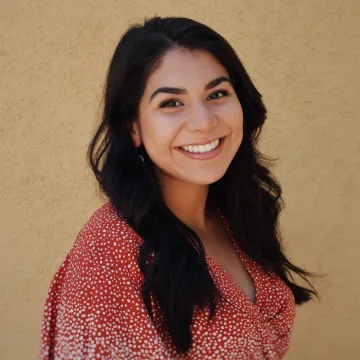
There is an abundance of literature on foodways at the U.S-Mexican border, yet there is no concise documentation of Mexican convenience stores or “mercados'' in the southwest borderlands. This project aims to register how mercados across the border recreate their spaces, resources, and define symbolic and cultural ties to their communities. The documentation of Mexican ethnic stores has considerable implications, for one; mapping out access to different food systems which can culturally determine terms of quality, nutrition, knowledge, and a sense of belonging to one's community. In this sense, the goal of this project represents a matter of political, environmental, community health, and the importance of cultural spaces, and to explore its relation to commodity consumption of ethnic products. Through such documentation will be produced a website that will register mercados, essentially creating a cultural mapping of such spaces along the southwest border and telling their stories of how they came to be. In this context this project will point to understanding how mercados construct through symbolic, material (food and resources), the integration of these communities in their cultural surroundings, especially in border-spaces. This project will document these crucial spaces, by interrogating, how do communities in the southwest border (re)produce their cultural identities through commodity consumption, and based on this, what else is being consumed beyond the foods and materials sold in mercado spaces? Further exploring the relationship between Mexican identity and mercados and the production's experience and knowledge at the southwest border.
Jazmin Gonzalez is a Master of Arts student in the Center for Latin American Studies. Her interdisciplinary research interests include Transnationalism, Borders and Migration, Environment, and Health Advocacy. Through her studies at Central Washington University in Anthropology, she has had the opportunity to conduct ethnographic research funded by the National Science Foundation in the coastal region of Mexico. Additionally, she has conducted visual ethnographies with farmworkers in the Yakima Valley, Washington State. Following her undergraduate studies, she worked during the pandemic alongside Latin American Consulates and funeral homes in the state of Washington. Currently, Jazmin combines her passion for medical and visual anthropology to shed light on better understanding how migration impacts commodities and ethnic stores or Mercado spaces, and the significance of symbolic and material elements. Jazmin is an advocate for community health, emphasizing the use of foods that hold important cultural significance in the region. Her vision for her upcoming project is to generate actionable knowledge in the field and highlight the realm of migration and community resilience.
Jorge Manzanilla-Pérez | PhD Program | Cultural Studies, Spanish and Portuguese | College of Humanities
The poetics of migrations
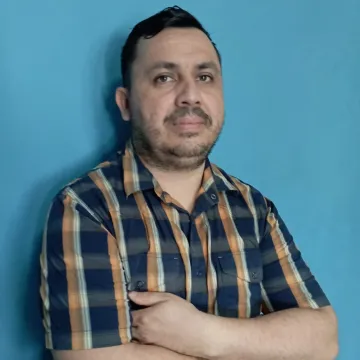
The first phase of this project aims to provide representation of the marginalized voices of migrants. It will include a creative writing workshop centered around migrants housed in a community center in the city of Tucson, Arizona. The result of this collective work will be published and distributed at different points of the border of the United States and Mexico. The second stage of the project will be comprised of a series of poetry workshops will be offered by various authors in Latin America and the United States and feature writing which discusses the poetics of migrations.
Jorge Manzanilla-Pérez is a Ph.D. student in Cultural Studies from the University of Arizona. He holds a Masters in Creative Writing from the University of El Paso, Texas, and is a graduate in Hispanic American Literature from the Universidad Autonoma de Guerrero. Jorge has published the following poetry books: Que me sepulten recostado en la palabra (Literary catharsis the drainage, 2011), Escarnio (Editorial Verso Destierro, 2014), Diáfano 23 (Fondo Editorial Tierra Adentro, Col. La Ceibita, 2014) and Stained Glass Window of all My bodies (Diablura Ediciones, 2015). Jorge was was awarded the José Díaz Bolio award in 2013 and the State Prize “Spirit of Letters” in 2015. This prestigious award was given with the honorable mention in the 2015 City of Mérida International Poetry Prize, Jorge was also a Pecda fellow in the young creators category in 2014. In El Paso, Texas. He was awarded the Creative Awards 2017. His work has been published in the New York Times and has been translated into Portuguese
Enrique Olivares-Pelayo | PhD Program | School of Geography, Development and Environment |College of Social & Behavioral Sciences
Running "Raza": Defining and Performing Racialized Identity Inside Borderlands Prisons
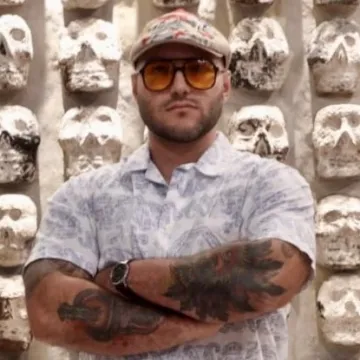
Running “Raza” contextualizes the violent, alienating, complicated, and racist experience of incarceration in Arizona as a phenomenon that is site specific to the Sonoran Borderlands, situated at the confluence of tensions in the political discourse of immigration and crime more broadly– as well as inside prison. My work brings to life the experience of being a young, bilingual prisoner with a multi-ethnic identity split by a transnational boundary between the U.S. and Mexico, highlighting the fraught interracial dynamics of prison society, colloquially known as “prison politics.” A prime example is the distinction made between Paisas, or Mexican nationals, who are categorized as a different “race” than Raza, or Chicanos. This racial distinction, thrown into stark relief by the tension and rivalry between Raza and Paisas in prison, is impossible to reproduce in free society. Arizona’s prison culture illuminates the way that transborder ethnic identities are refracted through the lens of carceral spaces. Through autoethnographic methods of (re)locating memory as a deeply place-based experience, Olivares-Pelayo work examines the narrative of not only my own incarceration, but the stories that frame punishment and justice in the Sonoran Borderlands.
Enrique Alan Olivares-Pelayo is a bilingual Tucsonan and first-generation Mexican-American. His extended family hails from Mexicali, Baja California, with roots that go back to Jalisco, Mexico. His research into the complicated racial dynamics within Arizona’s prison system are informed by four years experience incarceration, ending in 2014. He is currently pursuing a Ph.D. in geography at the School of Geography, Development, and Environment.
Juanita Sandoval | PhD Program | Teaching, Learning and Sociocultural Studies | College of Education
Migrant Shelters as Spaces of Pedagogy: Understanding Educational Practices in Migrant Shelters at the U.S./Mexico Border
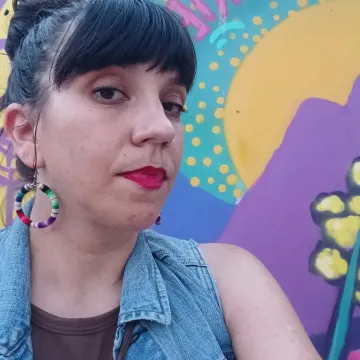
Woman looking at the camera
Confluencenter Staff
Undocumented migrants who traverse through Mexico face innumerable obstacles, however, there are also multiple networks in place to support them along the way. Despite extensive literature on migration on the U.S/ Mexico border, little attention has been paid to how migrant shelters can be viewed as pedagogical and transformative spaces of learning and activism. The 2023 Mellon-Fronteridades Graduate Fellowship will enable Sandoval to research the roles pedagogy and activism play within migrant shelters in Sonora, Mexico. Sandoval will spend time at various migrant shelters in Sonora and engage with the centers as pedagogical sites. She will examine the roles that knowledge sharing and learning play within migrant shelters. This research has potential for better understanding larger themes within transborder spaces and education.
Sandoval's culminating projects will include 1) spatial analysis and mapping of learning practices that occur within migrant shelters in Sonora, Mexico 3)curated literacy materials for migrant shelters in Sonora, Mexico 3) professional development materials for K- 12 educators 4) a future article for dissertation and publication.
Juanita Sandoval is a Ph.D. student in the Teaching Learning and Sociocultural Studies Department at the University of Arizona. She was born and raised in Albuquerque, New Mexico. She is a Spanish heritage language learner and identifies as a Chicana. In Albuquerque, Juanita was a public school teacher for ten years, where her focus was working in bilingual education and with emergent bilinguals. As an academic, she is interested in the intersections between teacher preparation programs and arts-based teaching methods, specifically to guide educators when working with diverse linguistic and cultural communities. She is also interested in working with migrant and refugee populations along the U.S./Mexico border.
Linfei Yi | PhD Program | East Asian Studies | College of Humanities
Hybridities: Languages and Identities of Chinese Americans in the Borderlands Amid the COVID-19 Pandemic

This project will document, analyze, and share the stories of Chinese Americans in the Arizona-Sonora borderlands. Although there is growing attention drawn to Asian Americans in Latin American studies, the studies specifically on language, race, and identity issues of Chinese Americans in the borderlands have been relatively limited. Chinese Americans living in this area have been discriminated against throughout history. Since the outbreak of the COVID-19 pandemic, Sinophobia has been reignited worldwide, including in both the United States and Mexico. Amid this unprecedented era, this project focuses on how K-12 Chinese American students construct and navigate their identities through their daily interactions with people in the borderlands. This project provides an empirical and timely account of the translingual, transcultural, and transracial experiences of the young generation of Chinese Americans. This project also investigates how people of other races perceive and position these young Chinese Americans. It is important to recognize the presence of Chinese Americans in the borderlands, not only because it covers the lacuna in the U.S.-Mexico border studies but also because the presence of Chinese Americans and the formation of communities impacted the larger Asian and Latin American communities nationwide and in Global Asia. The findings of the project will broaden the understanding of the lived experience in the U.S.-Mexico borderlands by presenting the research papers published in journals or conferences.
Linfei Yi is a doctoral candidate in the Department of East Asian Studies at the University of Arizona. Her research interests include Linguistic Anthropology, Language, race and ethnicity, and Asian American racialization. Her dissertation project examines the intertwined everyday racial, cultural, and linguistic practices in the multiethnic and multiracial communities, with a focus on Chinese diasporic communities in the Arizona-Sonora Borderlands. She regularly attends and presents her research at important national and international conferences, including NACCL (North American Conference on Chinese Linguistics), AAAL (American Association for Applied Linguistics), and AAA (American Anthropological Association). Her teaching specialties and interests include Advanced Modern Chinese, Languages and Cultures of East Asia, Language, and Race.

